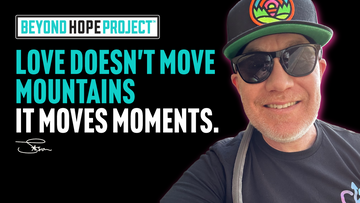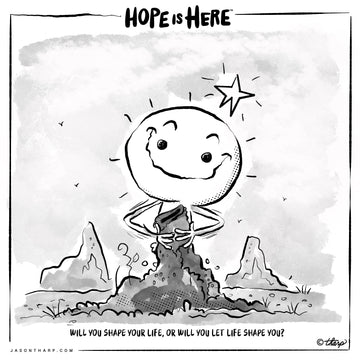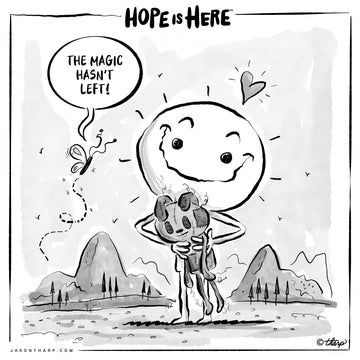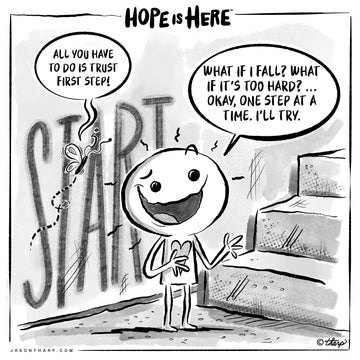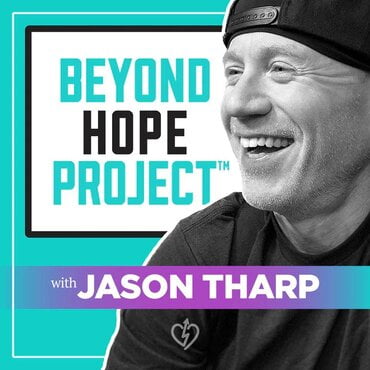There's a moment when everything narrows.
The world that once felt expansive, full of plans and possibilities, suddenly collapses into a single equation. Money. Time. Fear. Uncertainty. The math of survival becomes the only math that matters.
I know that moment. I've lived it. Grade 4 Glioblastoma. Seven months to live. The kind of diagnosis that doesn't leave room for philosophy or poetry. Just the raw, animal instinct to do whatever it takes to stay alive.
In that space, you become desperate. Not in a weak way. In a fierce, clawing, I-will-fight-for-every-breath way. You send emails you never thought you'd send. You ask for help you never thought you'd need. You strip away pride and pretense because survival doesn't care about your ego.
And here's what I learned in that stripping away: It's not chaos. It's love in motion.
Survival isn't selfish. It's love trying to find oxygen. It's the part of us that refuses to let the people we care about lose us. It's the part that says, "Not yet. Not like this." It's love, disguised as fight.
When 'What If' Becomes Our Lifeline
When logic collapses, imagination steps in.
"What if I make it?" "What if there's a treatment they haven't tried?" "What if this isn't the end?"
Our brains do this beautiful, terrifying thing when we're pushed to the edge. We start living in "what if" territory. And depending on how we wield it, "what if" can either trap us in fear or open us to possibility.
The neuroscience is fascinating. When we imagine something vividly, our brains light up the same neural pathways as if we were actually experiencing it. Hope isn't just emotional. It's physiological. Healing can begin in the mind before it ever shows up in the body.
But here's the edge: "What if" cuts both ways.
"What if I don't make it?" "What if the treatment fails?" "What if this is all there is?"
The same imagination that creates possibility can create prison. The difference isn't in the question. It's in where we point it.
"What if" is not escape. It's expansion. It's the mind's way of refusing to accept that the current reality is the only reality. It's hope doing reconnaissance work, scouting for paths forward when the road ahead looks like a dead end.
The Quiet Rescue
I sent an email I never thought I'd send.
Desperate. Vulnerable. The kind of message that strips away every layer of protection and just says, "I need help. I don't know what else to do."
And help came. Not in a blaze of glory. Not with fanfare or fireworks. Just people. Quiet people. People who saw the email and acted out of love.
A text message. A meal dropped off. Someone showing up to sit in silence because they knew words wouldn't fix anything, but presence might.
I scribbled this in the margin of my journal during that time:
"It's not moving mountains; it's the small acts that love is really made of."
We romanticize rescue. We think it has to be dramatic. The hero swooping in at the last second. The miracle cure. The sudden reversal of fortune.
But real rescue? Real love? It's quieter than that.
It's the friend who texts, "Thinking of you," on a Tuesday when nothing special is happening except that you're barely holding on.
It's the neighbor who mows your lawn without asking because they know you don't have the energy.
It's the person who listens without trying to fix, who sits with your pain without needing to solve it.
Healing rarely looks like fireworks. It looks like someone remembering you exist when you're not sure you want to.
Hope doesn't need to roar. It only needs to reach.
From Survival to Service
Something shifts when you come through darkness.
You start recognizing it in others. The narrowing. The desperation. The love disguised as fight. And when you see it, you can't unsee it.
The instinct that once said, "I need to survive," starts saying something different: "I need you to survive, too."
This is where survival evolves into service. Not in a martyr way. Not in a self-sacrificing, burn-yourself-out way. But in a deeply human way that says, "I know what it's like to be where you are, and I'm not going to let you go through it alone."
The same energy that clawed for breath becomes the energy that breathes life into others.
You send the text. You drop off the meal. You show up in the small, quiet ways that once saved you. Not because you have to. Because you remember what it felt like when someone did it for you.
Love becomes proactive. It stops waiting for permission. It stops wondering if it's enough. It just moves.
Because you know now. You know that small acts aren't small at all. They're everything.
The H.O.P.E. Reframe:
This is where the H.O.P.E. Algorithm comes alive. Not as theory. As practice.
Hyper-Awareness: See the small acts already saving you. Notice who's quietly showing up. Pay attention to the text messages, the gestures, the moments when someone thought of you and acted on it. Awareness isn't just about seeing problems. It's about seeing proof that you're not alone.
Open-Heartedness: Let love in, even when it's messy. Accept help without shame. This is the hardest part. We want to be strong. We want to handle it ourselves. But open-heartedness means recognizing that receiving love is just as powerful as giving it. It means letting people see you at your most vulnerable and trusting that they won't turn away.
Persistence: Keep showing up in small ways. Love daily, not dramatically. Persistence isn't about grand gestures. It's about the text you send on a random Wednesday. The five-minute phone call. The "I'm thinking of you" that doesn't need a response. It's about showing up consistently, not perfectly.
Empowerment: Recognize that your smallest act matters. You are someone's proof of hope. Every time you reach out, every time you show up, every time you choose love over fear, you're creating evidence that hope is real. You're not just surviving. You're becoming the quiet rescue for someone else.
Call to Reflection: Love in Motion
So here's the invitation.
Not to do more. Not to be more. Just to notice.
Ask yourself:
What small act of love changed my story this week?
Maybe it was a text you received. Maybe it was a moment of kindness from a stranger. Maybe it was your own decision to keep going when quitting felt easier.
How can I move through today as proof that love doesn't have to be loud?
Maybe it's reaching out to someone you've been thinking about. Maybe it's letting someone help you. Maybe it's just being present, fully present, with the people in front of you.
Love doesn't move mountains. It moves moments.
And moments, strung together, become the story of how we survived. How we healed. How we became the kind of people who don't just fight for our own breath, but breathe life into others.
That's hope. Not as a wish. As a strategy. As a series of small, deliberate acts that say, "I see you. I'm here. You matter."
That's love in motion.
Learn more at beyondhopeproject.com

